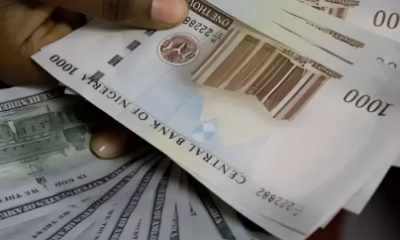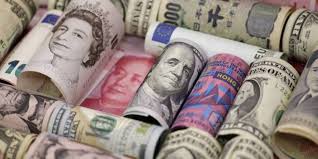The Central Bank of Nigeria (CBN) has been struggling to stabilize Nigeria’s currency exchange rate because of historical low crude prices and the shutdown of economic activities in major cities of Nigeria
Nigeria’s 5 years onshore Non-Deliverable forward contract posted its biggest drop by plunging 27% from N413.36 to close at N569.69 a price differential of N156. The 1-year Non-Deliverable forward contract was down 5% from N394.29 to close at N421.22 a price differential of N26.93.
One month NDF is now N395/$1 suggesting an imminent devaluation in the I&E window which could also impact the current official exchange rate of N360/$1 as well as the BDC rate which was devalued to N370/$1 some weeks back.
Plunging crude oil prices has negatively disrupted the economy of Africa’s biggest oil producer, just as the onslaught of Covid-19 closed businesses and disrupted human activities of people to contain.
Months ago Nigeria’s central bank devalued the naira against the dollar but is still under pressure to devalue the naira even further amid a scarcity of U.S dollars and poor export earnings.
This depreciation is a clear indication of the supply gap that currently exists in the foreign exchange market.
Demand is high but not enough supply to stabilize exchange rate. As things stand, the CBN will struggle to support the exchange rate as it did in 2017 when it newly introduced the I&E window. Back then, oil prices picked up and the government also received proceeds from its Eurobond offers.
The CBN’s expensive rate induced monetary policy also helped keep foreign dollars within Nigeria. The situation has changed from then as oil prices remain depressed and the economy is still reeling from the Covid-19 lockdowns.
Meanwhile, the Naira had hit N460 last week at the black market (its weakest level in three years), as dollar scarcity crippled the market.
The naira was selling at N442 to a dollar at the black market today according to the Everdon bureau de change. The black market rate remains 16% lower than the official exchange rate which is pegged at N360.
There is also likely going to be more depreciation of the naira if things remain the same since most local businesses that rely on foreign inputs with significant dollar demand will either have to pivot sourcing locally or go bankrupt.

 Health7 days ago
Health7 days ago
 Latest1 week ago
Latest1 week ago
 Football1 week ago
Football1 week ago
 Latest1 week ago
Latest1 week ago
 Latest5 days ago
Latest5 days ago
 Health6 days ago
Health6 days ago
 Latest1 week ago
Latest1 week ago
 News6 days ago
News6 days ago













